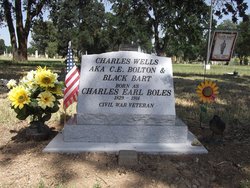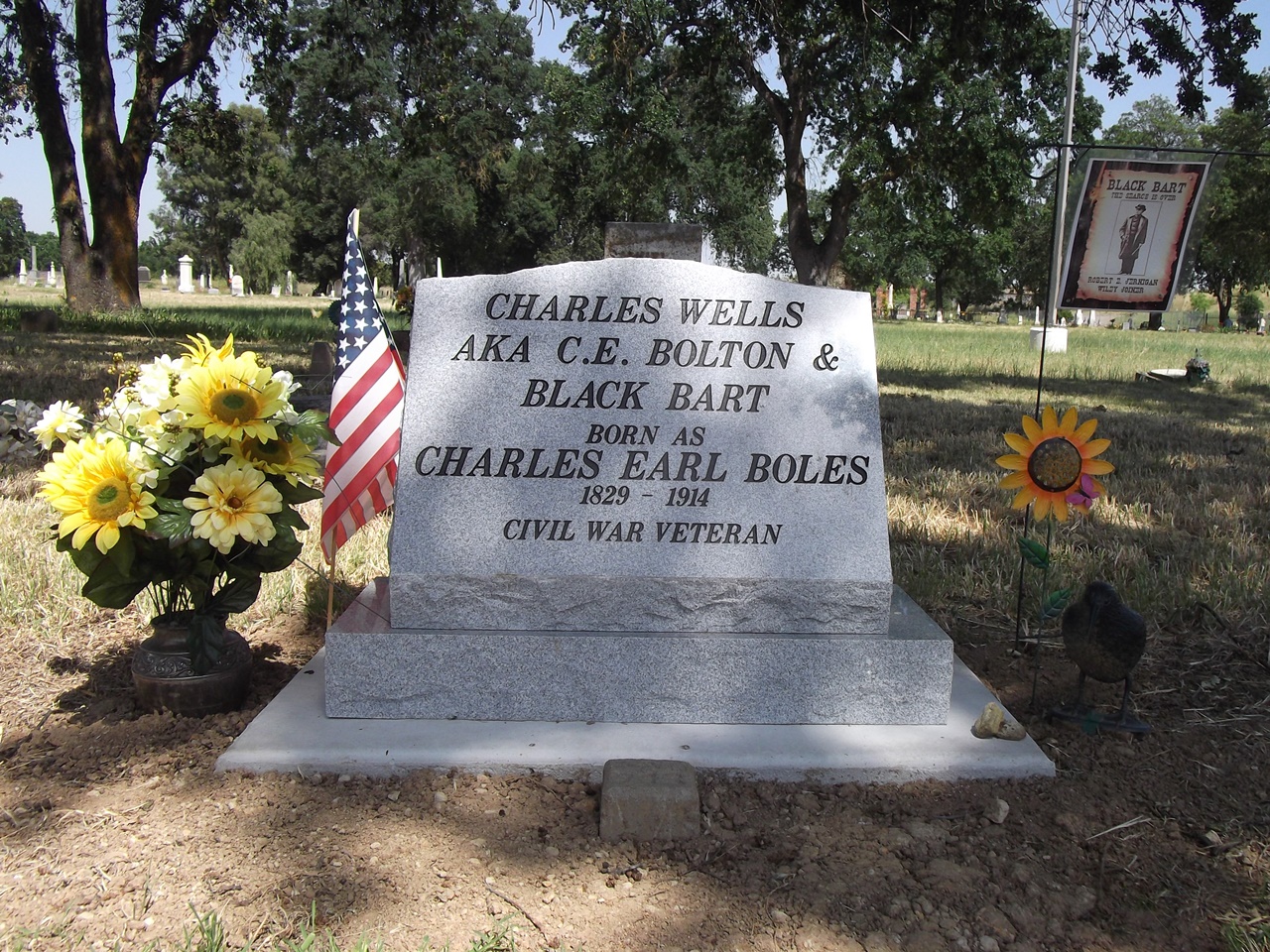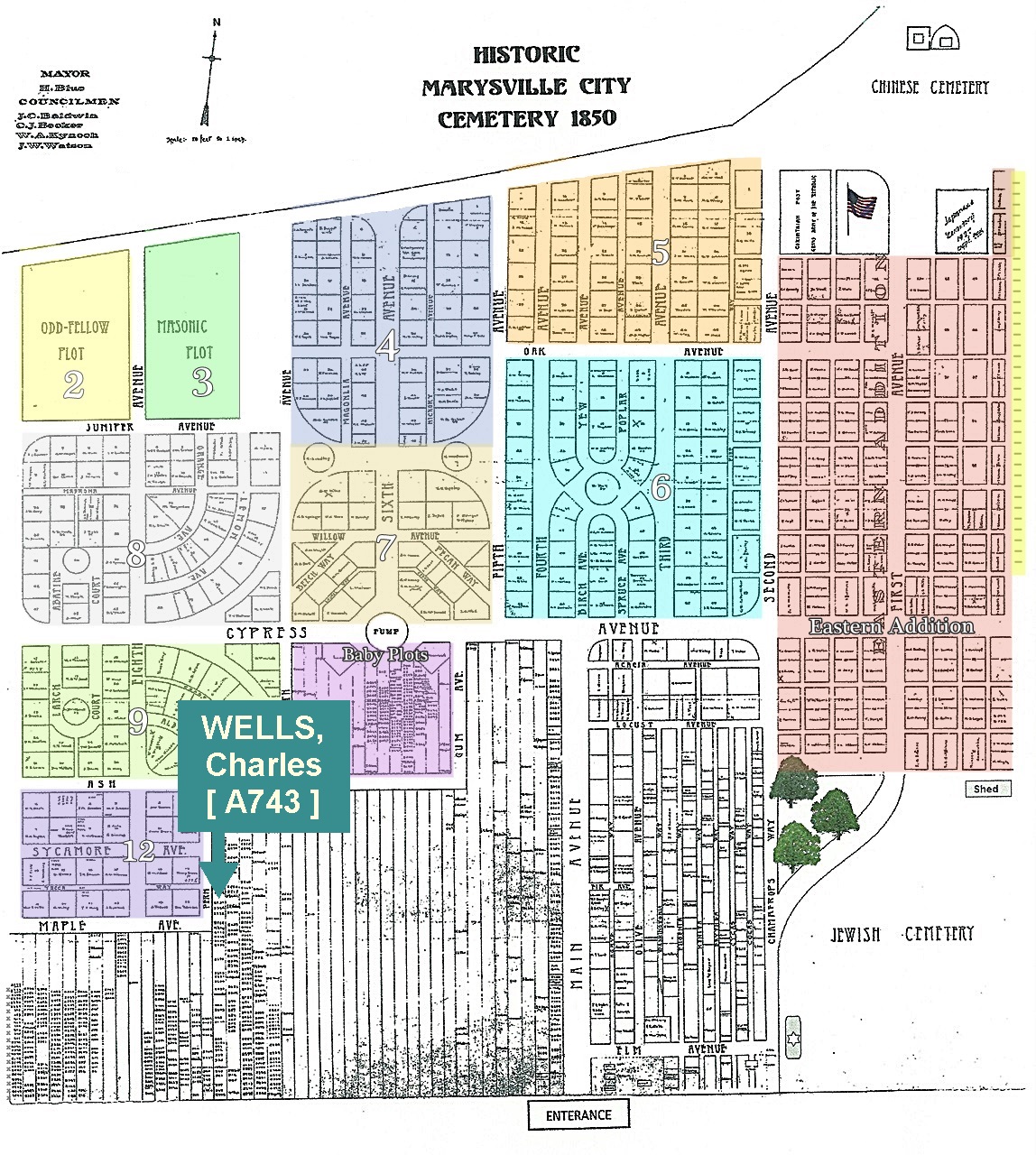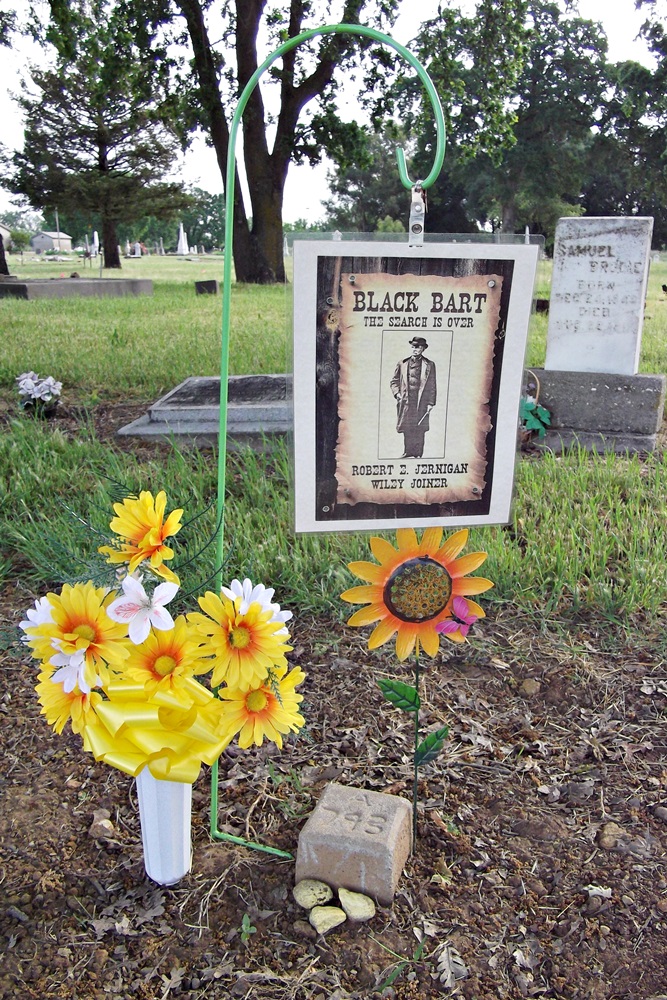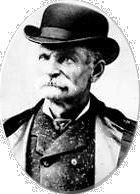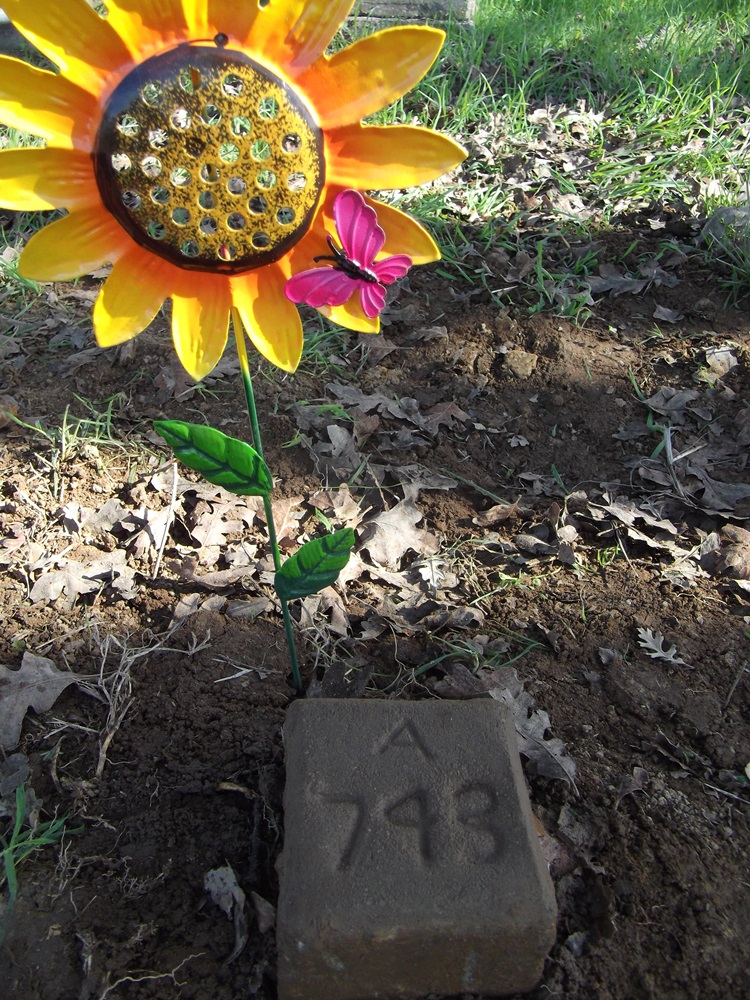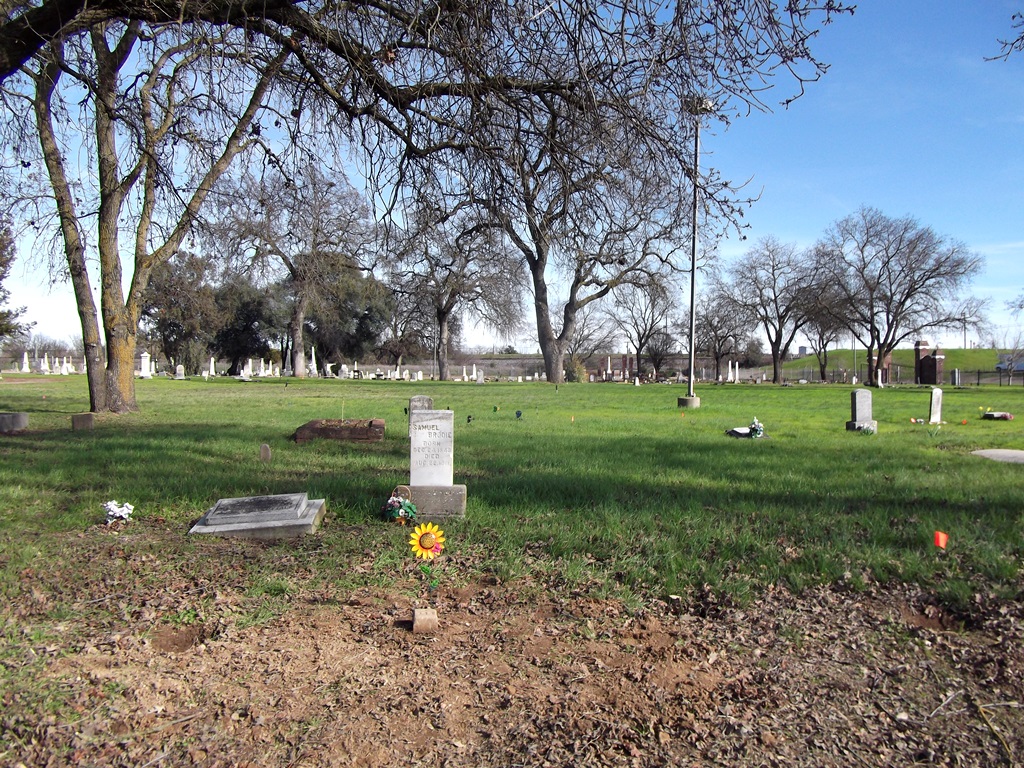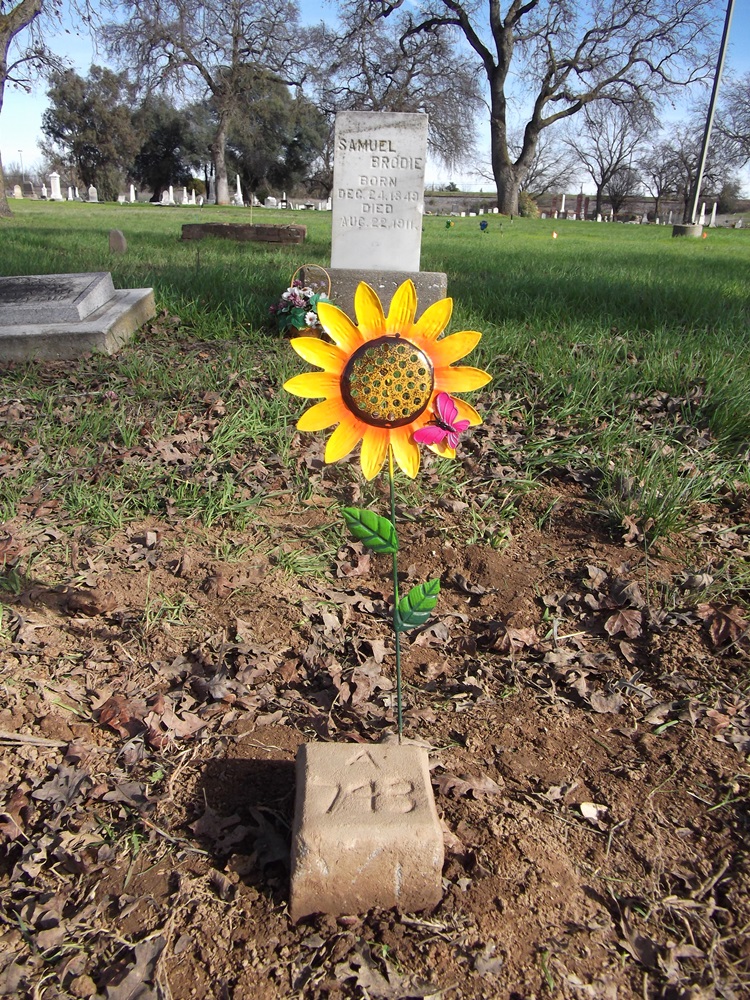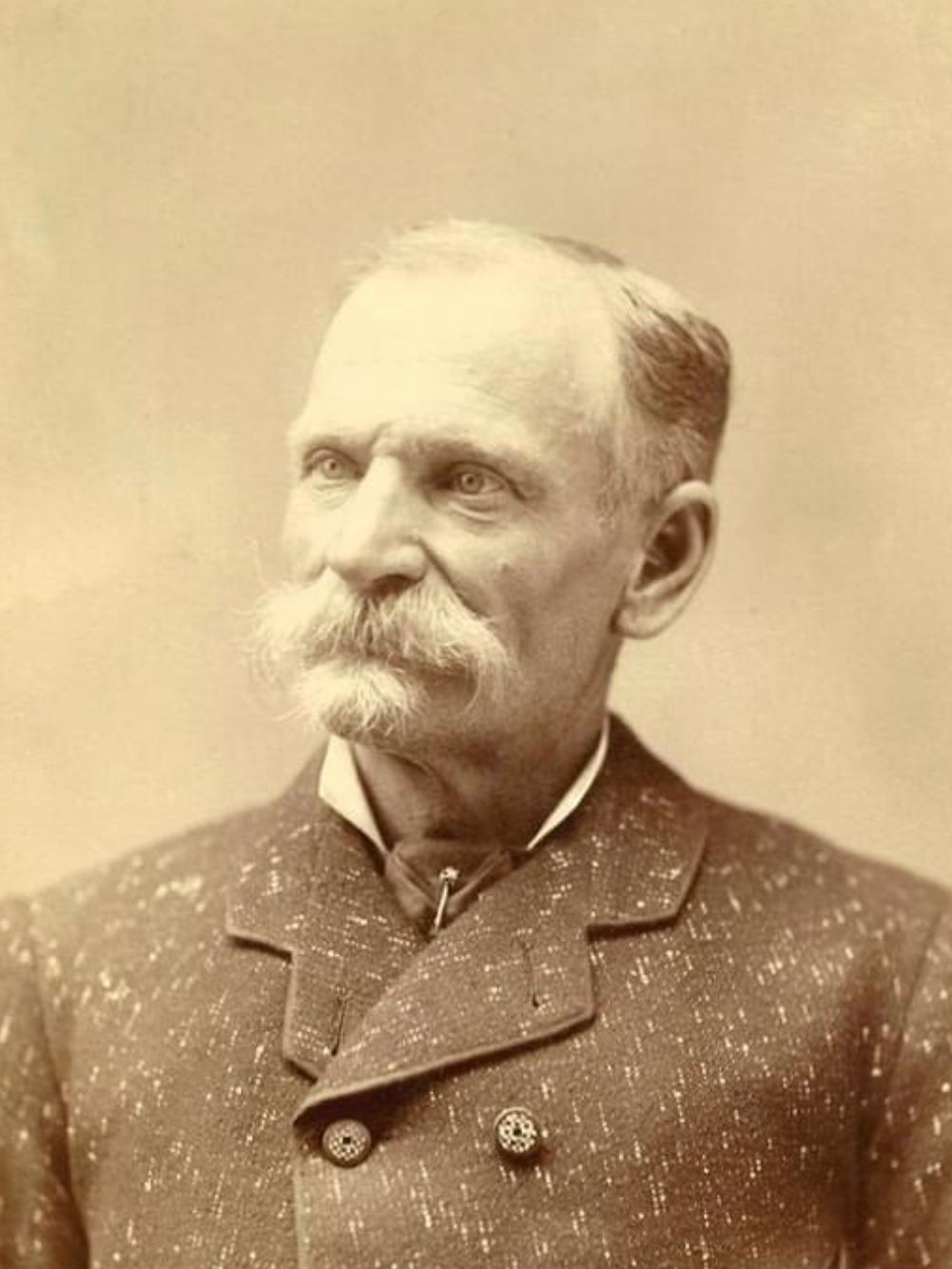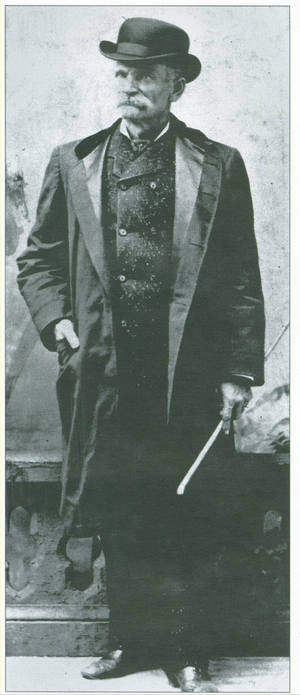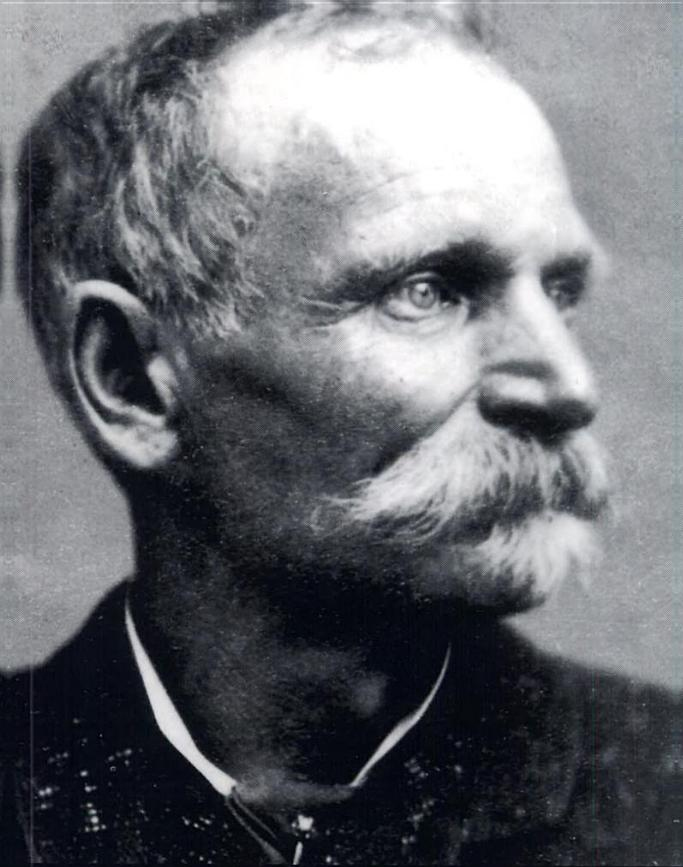and Charles E. Boles
---------------------------------------------------------------------------
Information below was obtained from "Book I, Record of Burials - City of Marysville - From 1870 To 1939", on page 121. (Maintained at Marysville City Hall)
Name: Wells, Charles
Date Interred: November 18, 1914
Age: 84 years
Sex: Male
Color/Race: White
Single/Married: Single
Nativity: Ireland
Place of Death: Marysville 11/16/14
Cause of Death: Apoplexy
Physician/Coroner: Dr. E. E. Gray
Number of Grave: 743
Location of Grave: City Cemetery∼Time Line:
•Born Charles E. Bowles in Norfolk Co., England c1828
•1861, August 13, joined 116th Reg't Illinois Infantry Co.B
•1863, July 1, promoted First Sergeant
•1864, May 26, severely wounded in Acworth, Georgia
•1865, June 7, Mustered out in Washington D.C. Returned home to family in Decatur, Illinois Headed for the California gold fields with poor luck
•1875 to 1883 robbed 27-28 stages from Sonora, north to Ukiah & Weaverville & back down to Downieville
•1883 shot in the hand by a Henry rifle on Funk Hill east of Copperopolis
•1883, November 16, goes to San Quentin (because of a laundry mark F.X.O.7.)
•1888, January 21, released from prison
•1914, Yuba Co., California, Black Bart dies.Black Bart
Born Charles Earl Bowles
Conviction(s) Robbery
Penalty 6 years
Status Time served
Occupation Miner, soldier
Charles was an English-born American Old West outlaw noted for his poetic messages left after two of his robberies. Also was a gentleman bandit, and one of the most notorious stagecoach robbers to operate in and around Northern California and southern Oregon during the 1870s and 1880s.
The fame he received for his numerous daring thefts is rivaled only by his reputation for style and sophistication.
In late 1849 Bowles (his friends called him Charley) and two of his brothers, David and James, took part in the California Gold Rush. They began mining in the North Fork of the American River in California.
Bowles mined for only a year before returning home in 1852. Soon he made the trip again to the California gold fields, with his brother David, again, and with another brother, Robert. Both David and Robert were taken ill and died in California soon after their arrival. Bowles continued mining for two more years before leaving.
Marriage In 1854, in Illinois, Bowles (who for some reason had changed the spelling of his last name to "Boles") married Mary Elizabeth Johnson. They had four children. By 1860, the couple had made their home in Decatur, Illinois.
Civil War The Civil War began in 1861. Boles enlisted at Decatur as a private in Company B, 116th Illinois Regiment, on August 13, 1862. He proved to be a good soldier, rising to the rank of first sergeant within a year. He took part in numerous battles and campaigns, including Vicksburg, where he was seriously wounded, and Sherman's March to the Sea. On June 7, 1865, he was discharged at Washington, D.C., and returned home to Illinois. He had received brevet (temporary) commissions as both second lieutenant and first lieutenant.
Prospecting After the long years of war, a quiet life of farming held little appeal to Boles, and he yearned for adventure. By 1867, he was prospecting again in Idaho and Montana. Little is known of him during this time, but in an August 1871 letter to his wife he mentioned an unpleasant incident with some Wells, Fargo & Company employees and vowed to pay them back. He then stopped writing, and after a time his wife assumed he was dead.
In late 1849 Bowles (his friends called him Charley) and two of his brothers, David and James, took part in the California Gold Rush. They began mining in the North Fork of the American River in California.
Boles, as Black Bart, committed 28 robberies of Wells Fargo stagecoaches across northern California between 1875 and 1883, including a number of robberies along the historic Siskiyou Trail between California and Oregon. Although he only left two poems, at the fourth and fifth robbery sites, it became his signature and his biggest claim to fame. Black Bart was very successful and made off with thousands of dollars a year.
Boles was terrified of horses and committed all of his robberies on foot. This, together with his poems, earned him notoriety. Through all his years as highwayman, he never fired a gunshot.
Boles was always courteous and used no foul language. He wore a long linen duster coat and a bowler hat. His head was covered with a flour sack with eye holes, and he brandished a shotgun. These distinguishing features became his trademarks.
On 26 July 1875, Boles robbed his first stagecoach in Calaveras County, on the road between Copperopolis and Milton. What made the crime unusual was the politeness and good manners of the outlaw. He spoke with a deep and resonant tone and told John Shine, the stagecoach driver, "Please throw down the box." As Shine handed the strongbox, Black Bart shouted, "If he dares to shoot, give him a solid volley, boys". Rifle barrels pointed at Shine from the nearby bushes, so he handed over the strongbox.
Shine waited until Black Bart vanished and then went back to get the plundered box. Upon returning to the scene, he found that the men with rifles in the bushes were actually carefully rigged sticks.
This first robbery netted Boles just $160.
The last holdup took place at the site, fittingly enough, of his first holdup, on Funk Hill, just southeast of the present town of Copperopolis. The stage had crossed the Reynolds Ferry on the old stage road from Sonora to Milton. The stage driver was Reason McConnell. At the ferry crossing, the driver picked up Jimmy Rolleri, the 19-year-old son of the ferry owner. The stage had to travel up a steep road on the east side of Funk Hill. Jimmy Rolleri had brought his rifle and got off at the bottom of the hill, intending to hunt along the creek at the southern base of the hill and then meet the stage at the bottom of the western grade. However, on arriving at the western side of the hill, he found that the stage was not there. He began walking up the stage road and, on nearing the summit, he encountered the stage driver and his team of horses.
Rolleri learned that as the stage had approached the summit, Black Bart had stepped out from behind a rock with his shotgun. Bart made McConnell unhitch the team and return with them over the crest again to the west side of the hill, where Rolleri encountered him. Bart then tried to remove the strongbox from the stage. Wells Fargo had bolted the strongbox to the floor inside the stage (which had no passengers that day). It took Bart some time to remove the box.
McConnell informed Rolleri that a holdup was in progress, and Rolleri came up to where McConnell and the horses were standing. He saw Boles backing out of the stage with the box. McConnell took Rolleri's rifle and fired at Bart twice as he started to run way. He missed. Jimmy took the rifle and fired just as Bart was entering a thicket. They saw him stumble as the bullet found its mark. Running to where they had last seen the robber, they found a bundle of mail he had dropped, and scattered further on was more mail, which had blood on it. Boles had been shot in the hand. After running about a quarter of a mile Boles stopped, too tired to run any farther. He wrapped a handkerchief around the wound to help stop the bleeding. Boles found a rotten log and stuffed the sack with the gold amalgam into it. He kept the $500 in gold coins. Boles buried the shotgun in a hollow tree but threw away everything else, except what he needed to get by, and escaped.
It should be noted that there is a manuscript written some 20 years after the robbery by stage driver Reason McConnell in which McConnell says that he fired all four shots at Bart. The first was a misfire, he thought the second or third shot hit Bart, and he knew that the fourth one hit him. Bart only had the wound to his hand, and if the other shots hit his clothing, Bart was unaware of it.
During his last robbery in 1883, when Boles was wounded and forced to flee the scene, he left behind several personal items, including a pair of eyeglasses, food, and a handkerchief with a laundry mark F.X.O.7. Wells Fargo Detective James B. Hume (who allegedly looked enough like Boles to be a twin brother, moustache included) found these several personal items at the scene. He and Wells Fargo detective Henry Nicholson Morse contacted every laundry in San Francisco, seeking the one that used the mark. After visiting nearly 90 laundry operators, they finally traced the mark to Ferguson & Bigg's California Laundry on Bush Street. They were able to identify the handkerchief as belonging to Boles, who lived in a modest boarding house.
Boles described himself as a "mining engineer" and made frequent "business trips" that happened to coincide with the Wells Fargo robberies. After initially denying he was Black Bart, Boles eventually admitted that he had robbed several Wells Fargo stages but confessed only to the crimes committed before 1879. It is widely believed that Boles mistakenly believed that the statute of limitations had expired on these robberies. When booked, he gave his name as T.Z. Spalding. When the police examined his possessions they found a Bible, a gift from his wife, inscribed with his real name.
The police report following his arrest stated that Boles was "a person of great endurance. Exhibited genuine wit under most trying circumstances, and was extremely proper and polite in behavior. Eschews profanity."
Wells Fargo pressed charges only on the final robbery. Boles was convicted and sentenced to six years in San Quentin Prison, but his stay was shortened to four years for good behavior. When he was released in January 1888, his health had clearly deteriorated owing to his time in prison. He had visibly aged, his eyesight was failing, and he had gone deaf in one ear. Reporters swarmed around him when he was released and asked if he was going to rob any more stagecoaches. "No, gentlemen," he smilingly replied, "I'm through with crime." Another reporter asked if he would write more poetry. Boles laughed and said, "Now, didn't you hear me say that I am through with crime?"
Black Bart's end is in keeping with the way the romantics of his day would have had it. Boles never returned to his wife, Mary, in Hannibal, Missouri, after his release from prison. However, he did write to her after his release. In one of the letters he said he was tired of being shadowed by Wells Fargo, felt demoralized, and wanted to get away from everybody. In February 1888 Boles left the Nevada House and vanished. Hume said Wells Fargo tracked him to the Palace Hotel in Visalia. The hotel owner said a man answering the description of Bart checked in and then disappeared. The last time the outlaw was seen was February 28, 1888.
A verse was left at the site of his July 25, 1878, holdup of a stage traveling from Quincy to Oroville. It read:
" Here I lay me down to sleep
to wait the coming morrow,
Perhaps success, perhaps defeat,
And everlasting sorrow.
Let come what will, I'll try it on,
My condition can't be worse;
And if there's money in that box
'Tis munny in my purse.
„
—Black Bart
and Charles E. Boles
---------------------------------------------------------------------------
Information below was obtained from "Book I, Record of Burials - City of Marysville - From 1870 To 1939", on page 121. (Maintained at Marysville City Hall)
Name: Wells, Charles
Date Interred: November 18, 1914
Age: 84 years
Sex: Male
Color/Race: White
Single/Married: Single
Nativity: Ireland
Place of Death: Marysville 11/16/14
Cause of Death: Apoplexy
Physician/Coroner: Dr. E. E. Gray
Number of Grave: 743
Location of Grave: City Cemetery∼Time Line:
•Born Charles E. Bowles in Norfolk Co., England c1828
•1861, August 13, joined 116th Reg't Illinois Infantry Co.B
•1863, July 1, promoted First Sergeant
•1864, May 26, severely wounded in Acworth, Georgia
•1865, June 7, Mustered out in Washington D.C. Returned home to family in Decatur, Illinois Headed for the California gold fields with poor luck
•1875 to 1883 robbed 27-28 stages from Sonora, north to Ukiah & Weaverville & back down to Downieville
•1883 shot in the hand by a Henry rifle on Funk Hill east of Copperopolis
•1883, November 16, goes to San Quentin (because of a laundry mark F.X.O.7.)
•1888, January 21, released from prison
•1914, Yuba Co., California, Black Bart dies.Black Bart
Born Charles Earl Bowles
Conviction(s) Robbery
Penalty 6 years
Status Time served
Occupation Miner, soldier
Charles was an English-born American Old West outlaw noted for his poetic messages left after two of his robberies. Also was a gentleman bandit, and one of the most notorious stagecoach robbers to operate in and around Northern California and southern Oregon during the 1870s and 1880s.
The fame he received for his numerous daring thefts is rivaled only by his reputation for style and sophistication.
In late 1849 Bowles (his friends called him Charley) and two of his brothers, David and James, took part in the California Gold Rush. They began mining in the North Fork of the American River in California.
Bowles mined for only a year before returning home in 1852. Soon he made the trip again to the California gold fields, with his brother David, again, and with another brother, Robert. Both David and Robert were taken ill and died in California soon after their arrival. Bowles continued mining for two more years before leaving.
Marriage In 1854, in Illinois, Bowles (who for some reason had changed the spelling of his last name to "Boles") married Mary Elizabeth Johnson. They had four children. By 1860, the couple had made their home in Decatur, Illinois.
Civil War The Civil War began in 1861. Boles enlisted at Decatur as a private in Company B, 116th Illinois Regiment, on August 13, 1862. He proved to be a good soldier, rising to the rank of first sergeant within a year. He took part in numerous battles and campaigns, including Vicksburg, where he was seriously wounded, and Sherman's March to the Sea. On June 7, 1865, he was discharged at Washington, D.C., and returned home to Illinois. He had received brevet (temporary) commissions as both second lieutenant and first lieutenant.
Prospecting After the long years of war, a quiet life of farming held little appeal to Boles, and he yearned for adventure. By 1867, he was prospecting again in Idaho and Montana. Little is known of him during this time, but in an August 1871 letter to his wife he mentioned an unpleasant incident with some Wells, Fargo & Company employees and vowed to pay them back. He then stopped writing, and after a time his wife assumed he was dead.
In late 1849 Bowles (his friends called him Charley) and two of his brothers, David and James, took part in the California Gold Rush. They began mining in the North Fork of the American River in California.
Boles, as Black Bart, committed 28 robberies of Wells Fargo stagecoaches across northern California between 1875 and 1883, including a number of robberies along the historic Siskiyou Trail between California and Oregon. Although he only left two poems, at the fourth and fifth robbery sites, it became his signature and his biggest claim to fame. Black Bart was very successful and made off with thousands of dollars a year.
Boles was terrified of horses and committed all of his robberies on foot. This, together with his poems, earned him notoriety. Through all his years as highwayman, he never fired a gunshot.
Boles was always courteous and used no foul language. He wore a long linen duster coat and a bowler hat. His head was covered with a flour sack with eye holes, and he brandished a shotgun. These distinguishing features became his trademarks.
On 26 July 1875, Boles robbed his first stagecoach in Calaveras County, on the road between Copperopolis and Milton. What made the crime unusual was the politeness and good manners of the outlaw. He spoke with a deep and resonant tone and told John Shine, the stagecoach driver, "Please throw down the box." As Shine handed the strongbox, Black Bart shouted, "If he dares to shoot, give him a solid volley, boys". Rifle barrels pointed at Shine from the nearby bushes, so he handed over the strongbox.
Shine waited until Black Bart vanished and then went back to get the plundered box. Upon returning to the scene, he found that the men with rifles in the bushes were actually carefully rigged sticks.
This first robbery netted Boles just $160.
The last holdup took place at the site, fittingly enough, of his first holdup, on Funk Hill, just southeast of the present town of Copperopolis. The stage had crossed the Reynolds Ferry on the old stage road from Sonora to Milton. The stage driver was Reason McConnell. At the ferry crossing, the driver picked up Jimmy Rolleri, the 19-year-old son of the ferry owner. The stage had to travel up a steep road on the east side of Funk Hill. Jimmy Rolleri had brought his rifle and got off at the bottom of the hill, intending to hunt along the creek at the southern base of the hill and then meet the stage at the bottom of the western grade. However, on arriving at the western side of the hill, he found that the stage was not there. He began walking up the stage road and, on nearing the summit, he encountered the stage driver and his team of horses.
Rolleri learned that as the stage had approached the summit, Black Bart had stepped out from behind a rock with his shotgun. Bart made McConnell unhitch the team and return with them over the crest again to the west side of the hill, where Rolleri encountered him. Bart then tried to remove the strongbox from the stage. Wells Fargo had bolted the strongbox to the floor inside the stage (which had no passengers that day). It took Bart some time to remove the box.
McConnell informed Rolleri that a holdup was in progress, and Rolleri came up to where McConnell and the horses were standing. He saw Boles backing out of the stage with the box. McConnell took Rolleri's rifle and fired at Bart twice as he started to run way. He missed. Jimmy took the rifle and fired just as Bart was entering a thicket. They saw him stumble as the bullet found its mark. Running to where they had last seen the robber, they found a bundle of mail he had dropped, and scattered further on was more mail, which had blood on it. Boles had been shot in the hand. After running about a quarter of a mile Boles stopped, too tired to run any farther. He wrapped a handkerchief around the wound to help stop the bleeding. Boles found a rotten log and stuffed the sack with the gold amalgam into it. He kept the $500 in gold coins. Boles buried the shotgun in a hollow tree but threw away everything else, except what he needed to get by, and escaped.
It should be noted that there is a manuscript written some 20 years after the robbery by stage driver Reason McConnell in which McConnell says that he fired all four shots at Bart. The first was a misfire, he thought the second or third shot hit Bart, and he knew that the fourth one hit him. Bart only had the wound to his hand, and if the other shots hit his clothing, Bart was unaware of it.
During his last robbery in 1883, when Boles was wounded and forced to flee the scene, he left behind several personal items, including a pair of eyeglasses, food, and a handkerchief with a laundry mark F.X.O.7. Wells Fargo Detective James B. Hume (who allegedly looked enough like Boles to be a twin brother, moustache included) found these several personal items at the scene. He and Wells Fargo detective Henry Nicholson Morse contacted every laundry in San Francisco, seeking the one that used the mark. After visiting nearly 90 laundry operators, they finally traced the mark to Ferguson & Bigg's California Laundry on Bush Street. They were able to identify the handkerchief as belonging to Boles, who lived in a modest boarding house.
Boles described himself as a "mining engineer" and made frequent "business trips" that happened to coincide with the Wells Fargo robberies. After initially denying he was Black Bart, Boles eventually admitted that he had robbed several Wells Fargo stages but confessed only to the crimes committed before 1879. It is widely believed that Boles mistakenly believed that the statute of limitations had expired on these robberies. When booked, he gave his name as T.Z. Spalding. When the police examined his possessions they found a Bible, a gift from his wife, inscribed with his real name.
The police report following his arrest stated that Boles was "a person of great endurance. Exhibited genuine wit under most trying circumstances, and was extremely proper and polite in behavior. Eschews profanity."
Wells Fargo pressed charges only on the final robbery. Boles was convicted and sentenced to six years in San Quentin Prison, but his stay was shortened to four years for good behavior. When he was released in January 1888, his health had clearly deteriorated owing to his time in prison. He had visibly aged, his eyesight was failing, and he had gone deaf in one ear. Reporters swarmed around him when he was released and asked if he was going to rob any more stagecoaches. "No, gentlemen," he smilingly replied, "I'm through with crime." Another reporter asked if he would write more poetry. Boles laughed and said, "Now, didn't you hear me say that I am through with crime?"
Black Bart's end is in keeping with the way the romantics of his day would have had it. Boles never returned to his wife, Mary, in Hannibal, Missouri, after his release from prison. However, he did write to her after his release. In one of the letters he said he was tired of being shadowed by Wells Fargo, felt demoralized, and wanted to get away from everybody. In February 1888 Boles left the Nevada House and vanished. Hume said Wells Fargo tracked him to the Palace Hotel in Visalia. The hotel owner said a man answering the description of Bart checked in and then disappeared. The last time the outlaw was seen was February 28, 1888.
A verse was left at the site of his July 25, 1878, holdup of a stage traveling from Quincy to Oroville. It read:
" Here I lay me down to sleep
to wait the coming morrow,
Perhaps success, perhaps defeat,
And everlasting sorrow.
Let come what will, I'll try it on,
My condition can't be worse;
And if there's money in that box
'Tis munny in my purse.
„
—Black Bart
Inscription
Charles Wells
Aka C.E. Bolton &
Black Bart
Born as
Charles Earl Boles
1829 - 1914
Civil War Veteran
